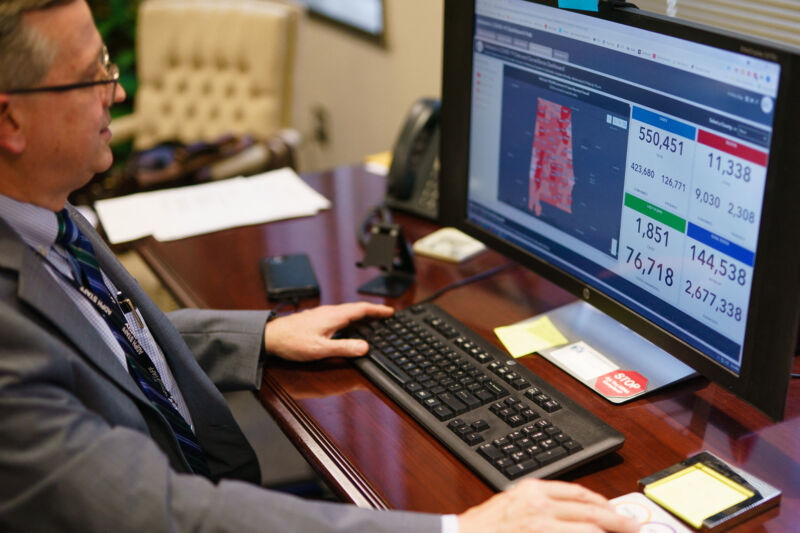
Medical professionals in Alabama are sounding the alarm over the monstrous surge of COVID-19 cases that is overwhelming the state’s hospitals—which are quickly running short on staff and space.
“We are set on a path that looks disastrous,” Dr. Donald Williamson, president and CEO of the Alabama Hospital Association, said in a state medical association COVID-19 update Thursday.
Currently, Alabama is reporting around 4,000 new cases per day. Medical experts in the Yellowhammer State expect that sometime next week, Alabama will exceed its previous record in average daily cases, which was set in January at around 4,500 new cases per day.
Meanwhile, hospitalizations are also nearing all-time highs of around 3,000 people hospitalized each day. Statewide, 81 percent of hospital beds were in use and ICU beds are at 100 percent capacity. The Alabama Department of Health confirmed to Ars on Thursday that the state reported having “negative 29” ICU beds available on Wednesday (an updated number for Thursday was not yet available).
“Basically, throughout the state, we’re now in situations where we’re seeing patients who show up in the ER needing to be admitted [and] spending—in some cases—days in the ER getting ICU-level care, in the ER, because there’s no place for them to go,” Williamson said.
Alabama doctors also said they’re seeing more young patients hospitalized with COVID-19 than before—and more of them are dying. Doctors attribute this to the hypertransmissible and potentially more dangerous delta coronavirus variant. The state’s number of pediatric COVID-19 patients currently hospitalized is higher than it has ever been in the pandemic, a record being set right before the start of a new school year.
Space, staff, and shots
Brimming hospitals isn’t just a problem for those seeking care for severe COVID-19. “Unfortunately, we’re still having strokes, heart attacks, motor vehicle accidents, kids are still falling out of trees,” Williamson said. If disaster strikes, there’s no guarantee there will be a bed, he added. Hospitals have already been transferring patients to different hospitals, diverting new patients, and sending patients out of state to Georgia. And many hospitals are delaying surgeries, like knee and hip replacements and even cancer-related surgeries.
But, while space in hospitals is creating a crunch, Williamson noted that his biggest concern is staffing. Staff at hospitals is already thin, and hospitals are trying to recruit more nurses.
“We can expand the space,” Williamson said. “The rate-limiting step in our response is going to be staff. That’s really the thing that makes me most anxious.”
Alabama State Health Officer Dr. Scott Harris said that he was in talks with the Federal Emergency Management Agency to assess if the state qualifies for disaster response medical teams to help with the patient load. Several neighboring states have already needed disaster relief teams.
In the live event, Harris, Williamson, and other Alabama medical officials pleaded with the public to get vaccinated, wear masks to lower transmission, and—for those exposed or infected to the pandemic coronavirus—to seek treatment with monoclonal antibodies early. The treatments, when given early, can prevent the illness from progressing to a severe stage. This, in turn, will keep more people from needing to head to the already overflowing hospitals.
Unfortunately, as Williamson noted, first doses of vaccines given now will take weeks to offer full protection. New vaccinations won’t help curb the current surge. As such, the state is set to exceed the case and hospitalization levels seen in January, when its health care system “almost failed,” Williamson said. “It is going to get very bad for everybody.”
https://arstechnica.com/?p=1788757

